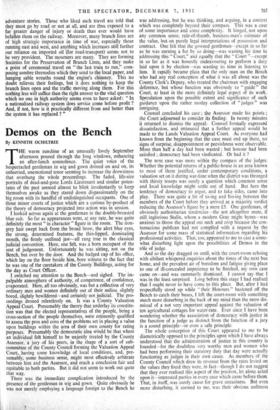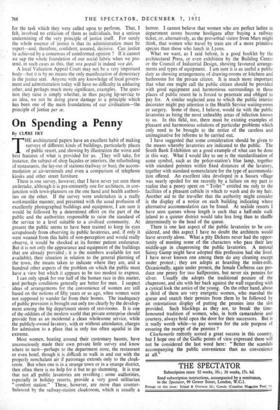Demos on the Bench
By KENNETH OCHILTREE
THE warm sunshine of an unusually lovely September afternoon poured through the long windows, enhancing an after-lunch somnolence. The quiet voice of the bespectacled gentleman in wig and gown droned on and on, its unhurried, unemotional tenor seeming to increase the drowsiness that overhung the whole proceedings. The faded, life-size portraits of dead-and-gone Lords Lieutenant and similar poten- tates of the past seemed almost to blink involuntarily to keep. themselves awake as they stared down dispassionately on the big room with its handful of undistinguished occupants. One of those minor courts of justice which are a curious by-product of the theory of democracy projected into action was in session. I looked across again at the gentleman in the double-breasted blue suit. So far as appearances went, at any rate, he was quite _ definitely the most "in character" figure in the room. The iron- grey hair swept back from the broad brow, the alert blue eyes, the strong, determined features, the thin-lipped, dominating mouth, the firmly outlined jaw—all rang true in the classical judicial convention. Here, one felt, was a born occupant of the seat of judgement. Unfortunately he was sitting, not on the Bench, but over by the door. And the badged cap of his office, which lay on the floor beside him, bore witness to the fact that he was one of the caretakers of the County Buildings, acting for the day as Court Officer. _ I switched my attention to the Bench—and sighed. The im- palpable atmosphere of authority, of competence, of confidence, evaporated. Here, all too obviously, was but a collection of very ordinary men and women definitely out of their milieu, slightly bored, slightly bewildered—and certainly not judicial. The pro- ceedings droned relentlessly on. It was a County Valuation Appeal Court. Presumably the theory that underlay its constitu- tion was that the elected representatives of the people, being a cross-section of the people themselves, were eminently qualified to assess the pros and cons of the problems set in placing a value- upon buildings within the area of their own county for rating purposes. Presumably the democratic idea would be that where an individual felt himself to be unjustly treated by the County Assessor, a jury . of his peers, in the shape of a. sort of sub- committee of the County Council forming the Valuation Appeal Court, having some knowledge of local conditions, and, pre- sumabl\y, some business sense, might most effectively arbitrate between him and the Assessor, and reach a conclusion fair and equitable to both parties. But it did not seem to work out quite that way.
There was the immediate complication introduced by the presence of the gentleman in wig and gown. Quite obviously he was not merely employing a language foreign to the Bench he was addressing, but he was thinking, and arguing, in a context which was completely beyond -their compass. This was a case of some importance and some complexity. It hinged, not upon any common sense, rule-of-thumb, business-man's estimate of the value, but-on purely legal interpretations of possession and contract. One felt that the gowned gentleman—except in so far as he was earning a fee by so doing—was wasting his time in addressing this "Court," and equally that the "Court "—except in so far as it was honestly endeavouring to perform a duty laid upon it by election—was wasting its time in listening to him. It rapidly became plain that the only man on the Bench who had any real conception of what it was all about was the County Clerk's Deputy, who treated the chairman with engaging deference, but whose function was obviously to " guide " the Court, at least in the more definitely legal aspect of its work. Speculation upon the possible extent and significance of such guidance upon the rather motley collection of " judges " was intriguing.
Counsel concluded his case ; the Assessor made his points ; the Court adjourned to consider its finding. In twenty minutes it returned to dismiss the appeal: Counsel formally expressed dissatisfaction, and intimated that a further appeal would be made to the Lands Valuation Appeal Court. As everyone had known from the beginning that the case must end up there, no signs of surprise, disappointment or peevishness were observable. More than half a day had been wasted; but honour had been satisfied ; democracy had been vindicated. Or had it ?
The next case was more within the compass of the judges. Whether the potential returns of a public-house in an area known to most of them justified, under contemporary conditions, a valuation set on it during war-time when the district was thronged with thirsty troops was surely a question which common sense and local knowledge might settle out of hand. But here the tendency of democracy to argue, and to take sides, came into play. There was quite a bit of to-ing and fro-ing between the members of the Court before they arrived at a majority verdict reducing the Assessor's figure by a mere 0. One gentleman, of obviously authoritarian tendencies—the not altogether mute, if still inglorious Stalin, whom a modern Gray might hymn—was anxious to throw the appeal out neck and crop because the con- tumacious publican had not complied with a request by the Assessor for some mass of statistical information regarding his professional activities. That, too, appeared to me to cast a some- what disturbing light upon the possibilities of Deinos in the role of judge.
And so the day dragged on until, with the court-room echoing with sibilant whispered enquiries about the times of the next bus home, and the prevalent air of boredom and fatigue giving place to one of ill-concealed impatience to be finished, my own case came on—and was summarily dismissed. I cannot say that I was in the least surprised. Long before this stage I had realised that I ought never to have come to this place. But, after I had respectfully stood up while "their Honours" hastened off the Bench to catch their buses, I left the court-room with something much more disturbing in the back of my mind than the mere disk missal of a not very important appeal against the valuation of ten agricultural cottages for water-rate. Ever since I have been wondering whether the association of democracy with justice in the function of a judge as distinct from the function of a jury is a sound principle—or even a safe principle. The whole conception of this Court appeared to me to be diametrically opposed to the principles upon which I have always understood that the administration of justice in this country is founded—for the doubtless very worthy men and women who had been performing their statutory duty that day were actually functioning as judges in their own cause. As members of the County Council which drew its revenue from the rates levied on the values they fixed they were, in fact—though I do not suggest that they ever realised this aspect of the position, let alone acted upon it—interested parties in every case which came before then That, in itself, was surely cause for grave uneasiness. But even more disturbing, it seemed to me, was their obvious unfitness for the task which they were called upon to perform. That, I felt, involved no criticism of them as individuals, but a serious undermining of the very principle of justice itself. For surely the whole essence of justice is that its administration must be expert—and, therefore, confident, assured, decisive. Can justice be achieved by a consensus of uninformed opinion ? If it cannot we sap the whole foundation of our social fabric when we pre- tend, in such cases as this, that vox populi is indeed vox dei.
A local Valuation Appeal Court may not be a very important body—but it is by no means the only manifestation of democracy in the justice seat. Anyone with any knowledge of local govern- ment and administration today will have no difficulty in adducing other, and perhaps much more significant, examples. The ques- tion they raise is simply whether, in thus paying lip-service to an idea, we not be doing grave damage to a principle which has been one of the main foundations of our civilisation—the. principle of justice per se.



















































 Previous page
Previous page